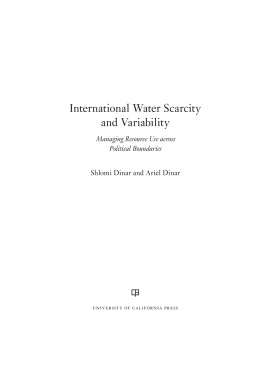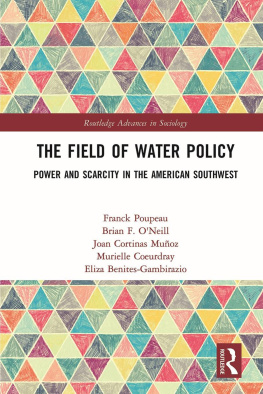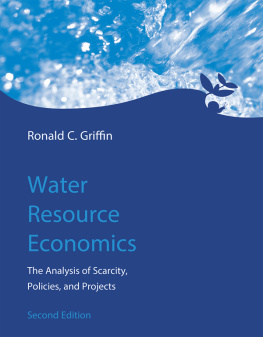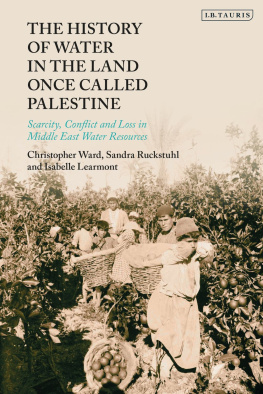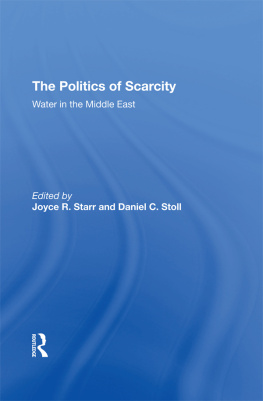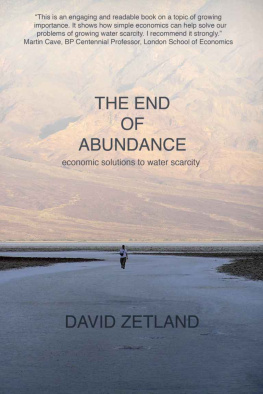This book is based to a large extent on our work and consultation with colleagues in the past decade and a half, and on discussions we had during seminars and conferences with scholars working in the field of international water. Although there are numerous people to thank, we would like to acknowledge the following individuals who helped us galvanize the ideas that culminated in this book: Scott Barrett, Thomas Bernauer, Brian Blankespoor, Itay Fischhendler, Mark Giordano, David Katz, Marc Kilgour, Daene McKinney, Sara McLaughlin Mitchell, Pradeep Kurukulasuriya, Lucia De Stefano, Erika Weinthal, Aaron Wolf, and Neda Zawahri.
1
Introduction
The Debate on Climate Change and Water Security
It is still important that the popular myth of water wars somehow be dispelled once and for all. This will not only stop unsettling and incorrect predictions of international conflict over water. It will also discourage a certain public resignation that climate change will bring war, and focus attention instead on what politicians can do to avoid it.... And it would help to convince water engineers and managers... that the solutions to water scarcity and security lie outside the water sector in the water/food/trade/economic development nexus.
Wendy Barnaby, Do Nations Go to War over Water? (2009, 283)
Much has been written about freshwater conditions around the world with implications for national and international security. The scientific and environmental literature tells us that water will become less available (and its supply more volatile and variable) in the future due to population growth, improved standards of living, increased pollution, and climate change. The economics literature claims that existing institutions and policy interventions are not keeping pace with increased scarcity and that water-supply and water-demand technological advancements are much less affordable to the developing world. Adopting these arguments, the popular press prophesies a less stable world, plagued by water wars that will result from competition over increasingly scarce water.
Despite these gloomy contentions and predictions, there are cases where, in spite of water scarcity (and variability) and the political and economic challenges that follow, cooperation and coordination are evidenced. Interestingly, the large majority of the works that document such cases focus on one particular river basin or a comparative analysis across a small number of basins and thus may be of lesser utility for general conclusions. More recently, scholars have attempted to more generally investigate the concepts of scarcity and variability, utilizing the corpus of international water treaties as well as other forms of large datasets and their corresponding empirical methodologies.
The main research question we attempt to address in this book is whether increased scarcity and/or variability of water resources leads parties (states) that share international water bodies to engage in violent conflict or even war, or whether there are mechanisms that help them mitigate such situations. To answer this question, this book develops an interdisciplinary approach for considering international water management under increased scarcity and variability. Our approach applies a theory rooted in international relations and economics to the analysis of scarcity, variability, and cooperation. It demonstrates the utility of the theory, utilizing the global set of transboundary water bodies. It provides a framework that allows scholars and policymakers to reflect on various future scenarios and assess the impact of policy interventions on the regional and global level.
The book begins with this introduction, which presents the water wars argument and considers aspects of cooperation, setting the groundwork for chapter 2 and for the rest of the empirical chapters that support our thesis in the book. Chapter 2 introduces the general scarcity-cooperation contention/theory by considering the relationship between scarcity and variability and the emergence of treaties. Chapter 3 empirically investigates that contention using econometric and statistical methods. Building on this empirical investigation, chapter 4 explores the way treaties (and the mechanisms they codify) assuage conflict and promote cooperation. Chapters 5 and 6 build on the empirical results of chapter 4, which demonstrate that certain institutional mechanisms promote sustained cooperation and coordination. Chapters 5 and 6 focus on case studies that demonstrate the utility of such mechanisms. The books concluding chapter summarizes the main arguments and results of the book with policy implications, in addition to assessing some of the shortcomings of our argument, and providing suggestions for future research. A detailed description of the books outline and organization is provided later in the chapter.
CLIMATE AND HYDROLOGY
Climatic conditions have a direct impact on the hydrology of river basins. Climatic change will most likely affect the variability of river flows and have a variety of additional impacts on the hydrologic cycle (Jury and Vaux 2005; Miller and Yates 2006). The change in flow variability will affect populations, who will be less able to plan based on water availability and supply trends (Milly et al. 2008). Changes will not be consistent, and regions will experience either increases or decreases in river discharge compared with present observations (Palmer et al. 2008).

